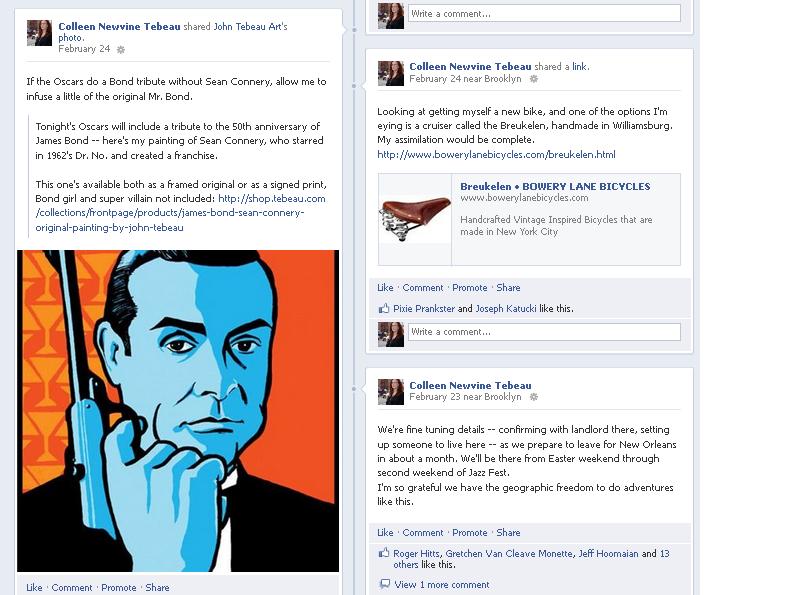
My husband, John Tebeau, is an artist. He’s been an artist since elementary school.
Most of our close friends and family are aware of this, in part because we’ve probably invited them to at least one of his art shows over the years.
But as you get farther out into our social circle, naturally people know less about what we do and/or forget what they might have known at one time.
So we try to do un-pushy reminders to just in case they’re interested.
We recently got a lovely lesson in the value of doing that, when a friend of mine from business school bought one of John’s paintings.
John did a painting years ago of Sean Connery as James Bond, so when the Oscars did a tribute to Bond, we posted an image of the painting to John’s Facebook artist page. Later I shared it over to my personal profile.
A friend quickly responded by sending a private message saying she and her husband wanted to buy the painting.
As we exchanged messages about the purchase, she explained she and her husband had been looking for art for their newly finished basement. Most of the art they already own has come from artists they’ve personally met and they hadn’t yet found something for the basement where they liked both the art and the artist.
Her husband loves Connery’s Bond, and they know us, so it was an easy decision.
On one level, it surprised me that if they were actively in the market for art and wanted to buy from a connection, that they wouldn’t have already perused John’s website.
But then it reminded me of one of the most basic marketing rules: it’s not just reaching your customer with the message about what you do, but reaching your customer when he or she is ready to buy.
Do you care who the best plumber is in your neighborhood before your toilet leaks onto the floor? Does it matter to you where you can find a good seamstress if you don’t have clothing that needs work?
It wasn’t important for my friend to know and remember that my husband is an artist — until they wanted to buy art. In that moment, a simple JPG with no price information and no direct call to action was enough to motivate a purchase.
Bottom line: We’re all overloaded with information so don’t assume your potential customer knows what you have to offer. Providing regular reminders might help you reach someone who’s just become interested in what you do, or might help your friends or family keep you in mind in case someone they know needs a referral.
And since I try to practice what I preach …
Colleen Newvine Tebeau is a former reporter and editor who then earned her MBA at University of Michigan with emphases in marketing and corporate strategy. She is a marketing consultant who helps small and midsized organizations with strategy and tactics, including social media and communications.

Marketing Monday: Never assume your customer knows what you have to offer

Leave a reply